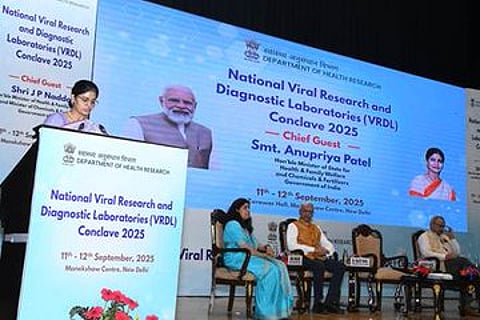

Anupriya Patel, Union Minister of State for Health and Family Welfare, inaugurated the National Virus Research & Diagnostic Laboratory Conclave 2025 (VRDL Conclave) in New Delhi on Thursday, celebrating India’s achievements in medical research and diagnostics.
The two-day event saw the participation of Rajiv Bahl, Secretary of the Department of Health Research (DHR) and Director-General of Indian Council of Medical Research (ICMR), and Rajeev Singh Raghuvanshi, Drug Controller General of India.
Lauding DHR, ICMR, and VRDLs, Patel said “each laboratory, each innovation, each collaboration contributes to the vision of Viksit Bharat.” Addressing scientists from 165 VRDLs across the country, she added, “our VRDLs have stood as sentinels in protecting the country during the COVID-19 pandemic and beyond,” noting their role in virus sequencing and validating nearly 1,700 diagnostic commodities.
Patel shared that 16 VRDLs are now equipped with Bio-Safety Level-3 facilities, enabling research on high-risk pathogens, and credited VRDLs with early detection of Nipah, Zika, and Kyasanur Forest Disease outbreaks. She emphasised the pivotal role of the National Institute of Virology (NIV), Pune — India’s only BSL-4 lab — and announced that under the Ayushman Bharat Health Infrastructure Mission, four new regional NIVs are coming up in Jabalpur, Dibrugarh, Bangalore, and Jammu.
Highlighting India’s advances in combating Tuberculosis (TB), she said:
“Portable handheld X-ray machines have been deployed to remote villages as part of the 100-day TB campaign. DeepCXR, an AI-based screening tool trained on over 75,000 chest X-ray images, is now freely available for mass TB screening. The CyTb skin test, priced affordably at ₹199, offers a cost-effective method to detect latent TB, while PathoDetectTM provides rapid and accurate molecular diagnosis for TB and drug resistance in a single test. A modified BPaL treatment regimen trial has demonstrated cure rates of up to 90 per cent for drug-resistant TB with reduced side effects.”
She also underscored efforts to eliminate Sickle cell disease under the National Sickle Cell Anaemia Elimination Mission, noting that the cost of rapid diagnostic tests has dropped from ₹300 to ₹28 due to Health Technology Assessment in India (HTAIn) studies validated by ICMR.
Patel said HTAIn has been crucial in optimising healthcare costs under the Ayushman Bharat Pradhan Mantri Jan Arogya Yojana (PM-JAY) by revising 855 health benefit packages using cost data from 86 hospitals.
She highlighted ICMR’s collaboration with the Central Drugs Standard Control Organisation (CDSCO) to develop standard protocols for in-vitro diagnostics (IVDs). Patel also released the In-Vitro Diagnostics (IVD) validation portal and protocols, saying:
“The new IVD validation portal launched today will facilitate faster, more transparent, and industry-friendly validation processes.”
Patel released the first VRDL Bulletin, adding that “this will enable real-time tracking of viral infections to improve resource allocation by both state and central governments.”
She said, “From early detection of outbreaks to indigenous test validations, from TB and sickle cell innovations to the establishment of new NIVs and the pioneering One Health collaborations, India is building a resilient, self-reliant, and globally relevant health research ecosystem.”
She further noted that under the Prime Minister’s leadership, India has launched the National One Health Mission, which unites 13 departments for the first time globally, with 10 VRDLs now part of a National BSL-3 Network under this mission.
Rajiv Bahl said the conclave will unveil initiatives to strengthen India’s ability to respond to viral outbreaks, adding:
“Just like India's air defence was impenetrable during the recent Operation Sindoor, the VRDL network will also act as an impenetrable bio-defence of India.”
He noted that with 164 laboratories across 26 states and 5 union territories, the VRDL network has been key in tackling COVID-19, Nipah, Zika, Kyasanur Forest Disease, and Crimean-Congo Hemorrhagic Fever.
Rajeev Singh Raghuvanshi stated that CDSCO and ICMR have jointly developed 39 standard evaluation protocols for high-risk IVDs covering diseases like TB, Malaria, and Nipah Virus, calling it:
“the first of its kind globally, representing a unique partnership between a National Regulatory Authority and a National Research Institute to create standardised protocols for assessing the performance of IVD kits.”